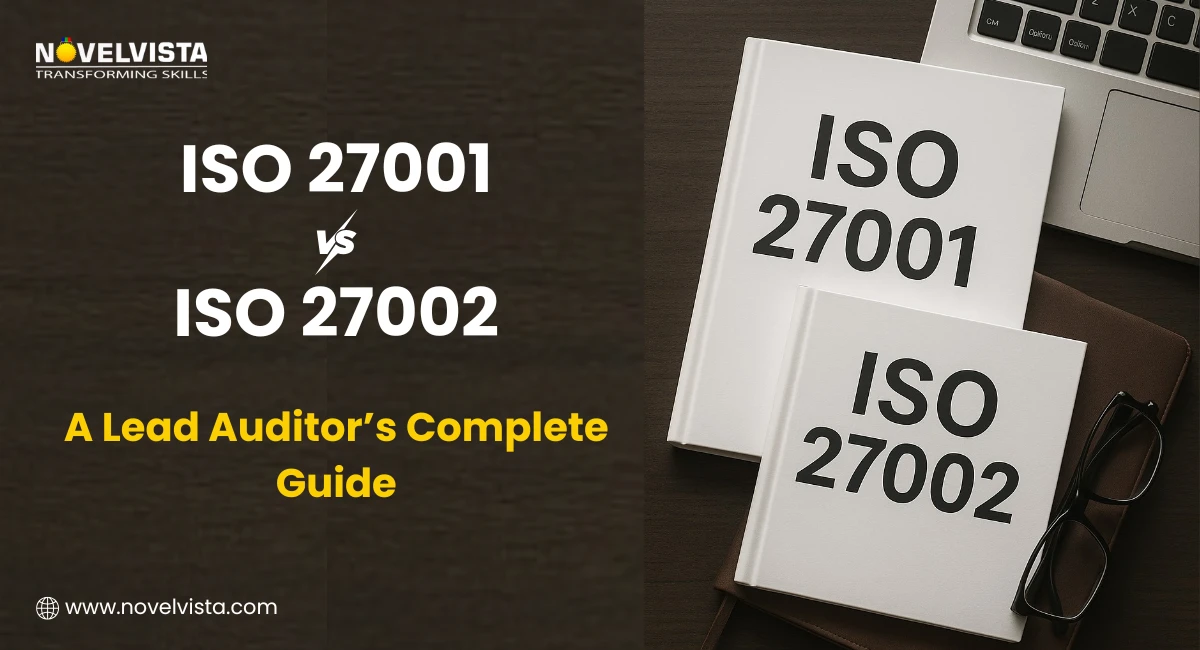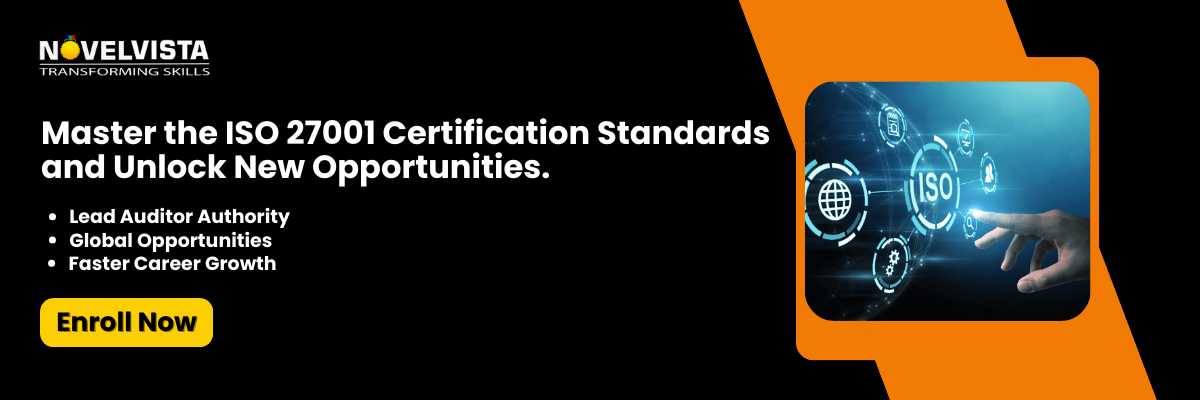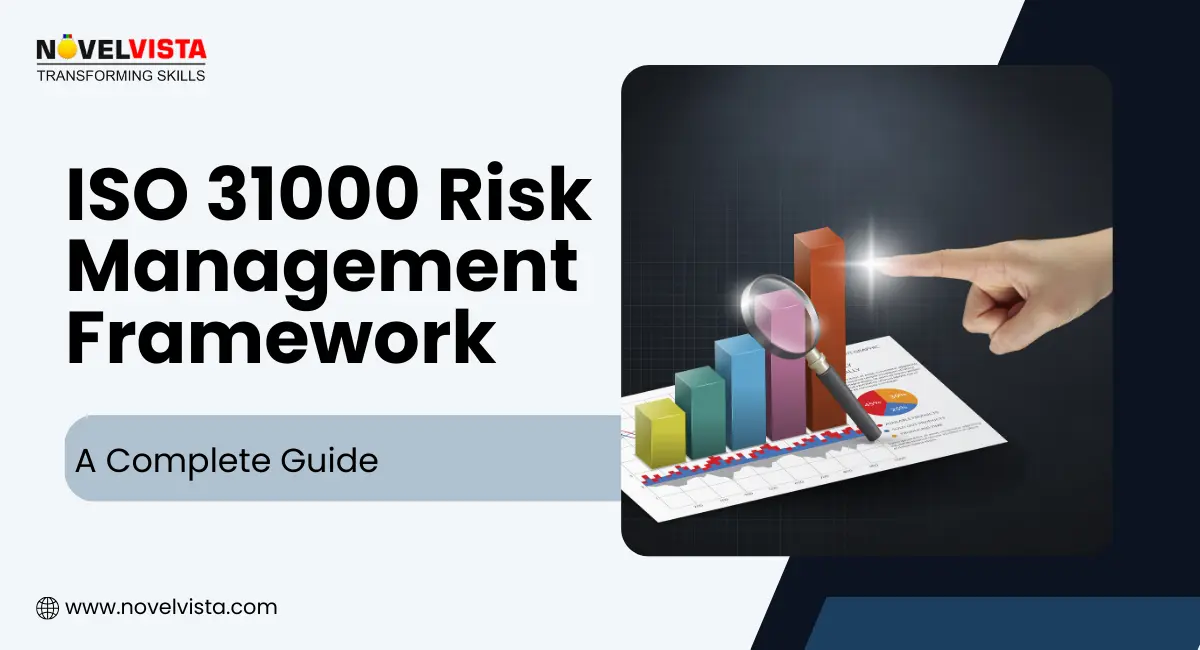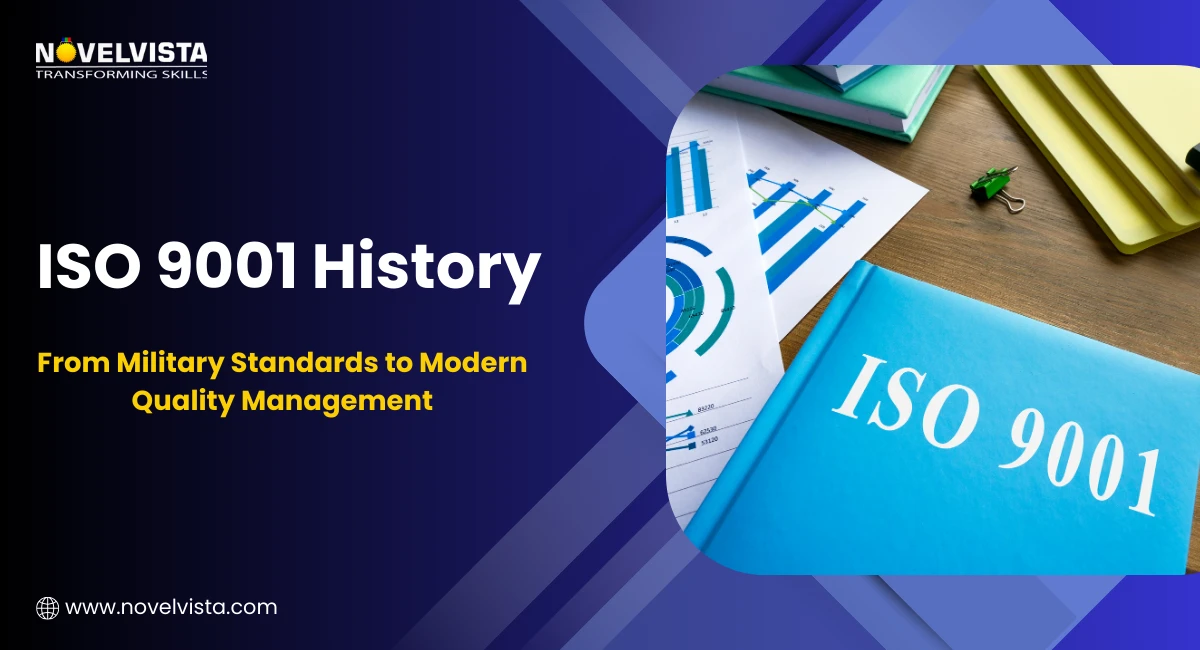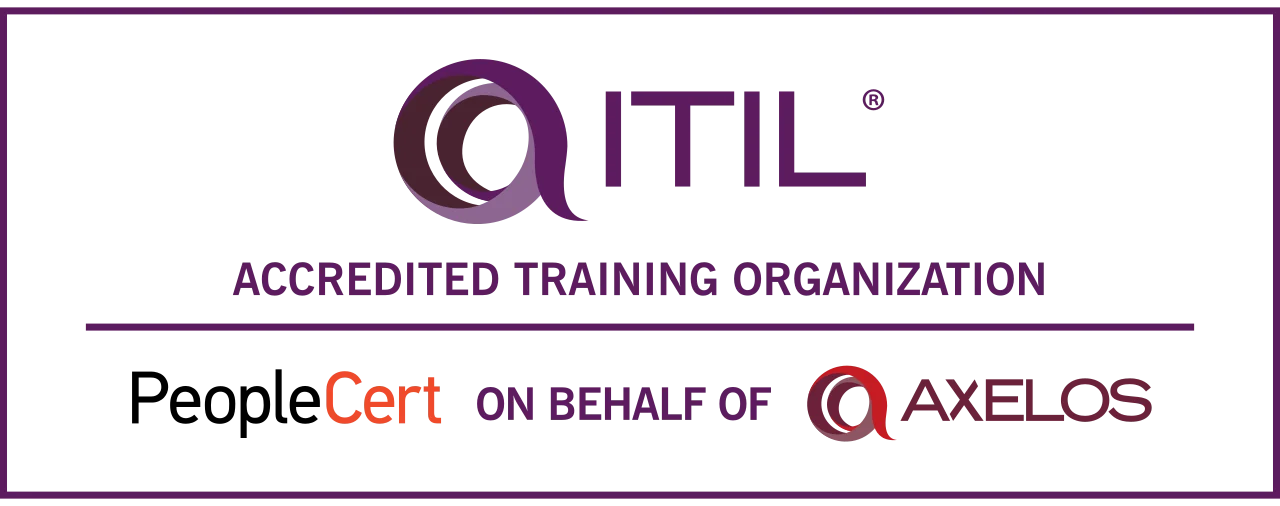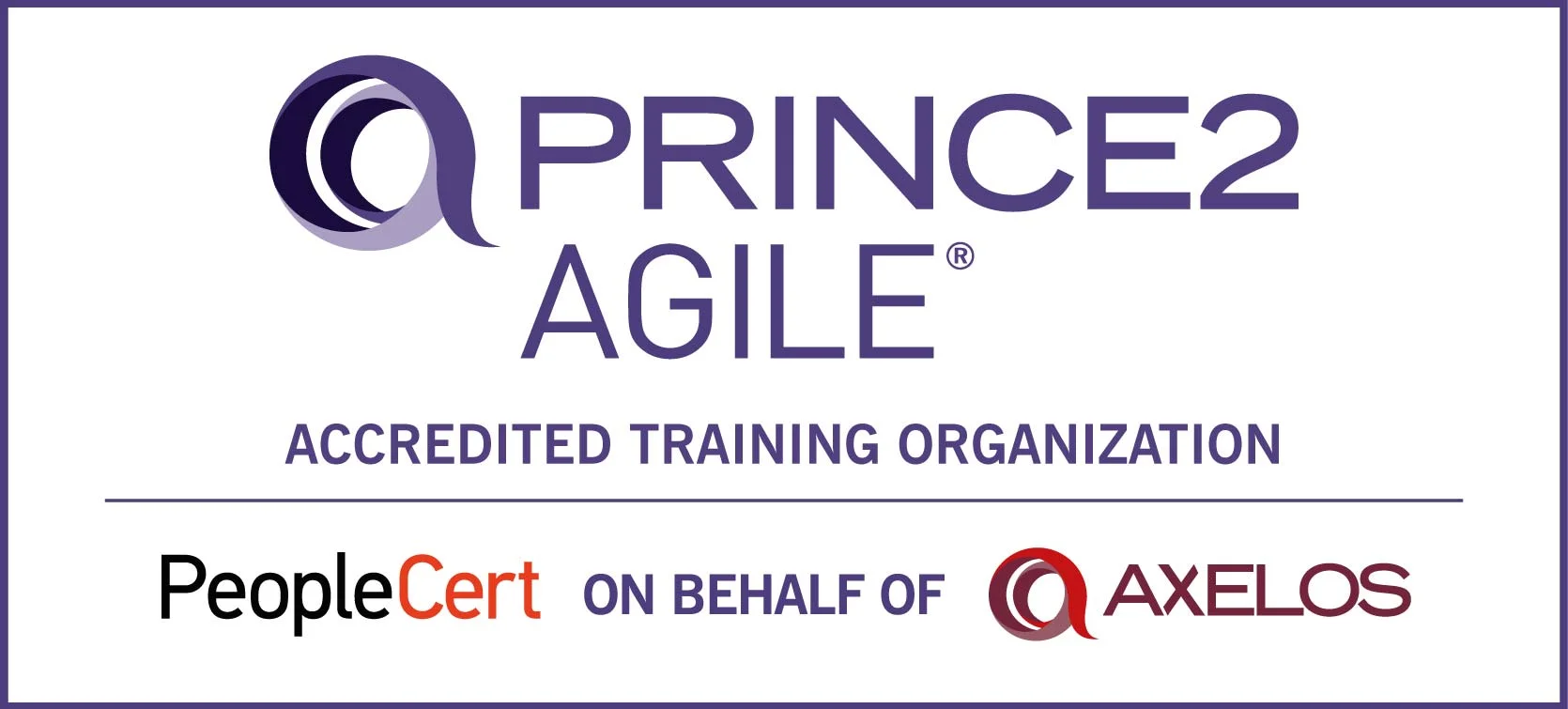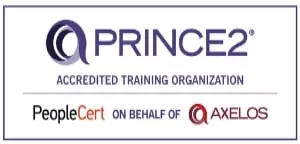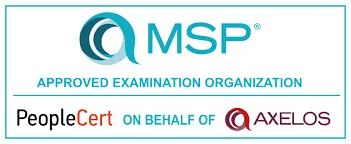- ISO 27001: The Framework for Information Security
- ISO 27002: Guidance for Security Controls
- ISO 27001 vs ISO 27002: Key Differences
- ISO 27001 vs ISO 27002: Differences for Lead Auditors
- The Role of Lead Auditors in ISO 27001 & ISO 27002 Audits
- Benefits of ISO 27001 & ISO 27002 from a Lead Auditor’s Lens
- Common Challenges for Lead Auditors
- Conclusion
- Next Step: Get Certified with NovelVista
When it comes to auditing information security, iso 27001 vs iso 27002 is a key distinction every lead auditor must understand. Simply put, ISO 27001 is the certifiable framework that sets requirements for an organization’s information security management system (ISMS), while ISO 27002 is the guidance document that explains how to implement security controls effectively. Understanding both is critical to ensure robust audits, compliance, and risk management.
For lead auditors, knowing the differences means being able to verify organizational compliance, evaluate control effectiveness, and guide organizations toward best practices. In this guide, we’ll break down ISO 27001 and ISO 27002, explain their differences, and show how auditors can leverage both to strengthen ISMS audits.
ISO 27001: The Framework for Information Security
ISO 27001 is designed to help organizations establish, implement, maintain, and improve an ISMS. Its main purpose is to protect information systematically and consistently by applying risk management practices. Here’s what makes ISO 27001 essential:
- Focus Areas: Policies, processes, risk management, defined roles, and continual improvement.
- Certifiable Standard: Organizations can achieve formal certification, showing stakeholders their commitment to information security.
- Auditor’s Role: Lead auditors verify compliance with clauses 4–10, check risk assessments, assess top management involvement, and ensure continual improvement practices are implemented.
ISO 27001 lays the foundation for a strong security posture, but it doesn’t prescribe exactly how controls should be implemented. That’s where ISO 27002 comes in.
Get complete information about the ISO 27001 Certification in our comprehensive blog, here.ISO 27002: Guidance for Security Controls
ISO 27002 complements ISO 27001 by providing detailed guidance on implementing security controls. Think of it as a reference manual that explains how to apply the high-level requirements set by ISO 27001.
- Purpose: Helps organizations implement the controls listed in Annex A of ISO 27001.
- Non-Certifiable: ISO 27002 itself is not a standard you get certified for, it’s used as a practical guide.
- Auditor’s Role: Lead auditors use ISO 27002 as a benchmark to assess whether the organization has implemented controls effectively and if risks are adequately addressed.
By combining ISO 27001’s framework with ISO 27002’s detailed guidance, auditors can perform thorough, actionable audits that enhance information security across organizations.
ISO 27001 vs ISO 27002: Key Differences
Here’s a clear comparison for auditors and organizations:
Feature |
ISO 27001 |
ISO 27002 |
Purpose |
ISMS framework, certifiable |
Guidance for implementing controls |
Scope |
High-level requirements |
Detailed control guidance |
Certifiable? |
Yes |
No |
Focus |
What to do to secure information |
How to implement security controls effectively |
Auditor Use |
Verify compliance with ISMS clauses |
Assess control adequacy and effectiveness |
Relation |
Base framework for security |
Provides depth to meet ISO 27001 requirements |
This table makes it easy to see how iso 27001 vs iso 27002 complement each other; one sets the framework, the other explains the execution.
Lead Auditor’s Playbook
ISO 27001 & ISO 27002
Master both standards in one go.
Get step-by-step audit flows,
key questions, and real-world case studies
trusted by top auditors.
ISO 27001 vs ISO 27002: Differences for Lead Auditors
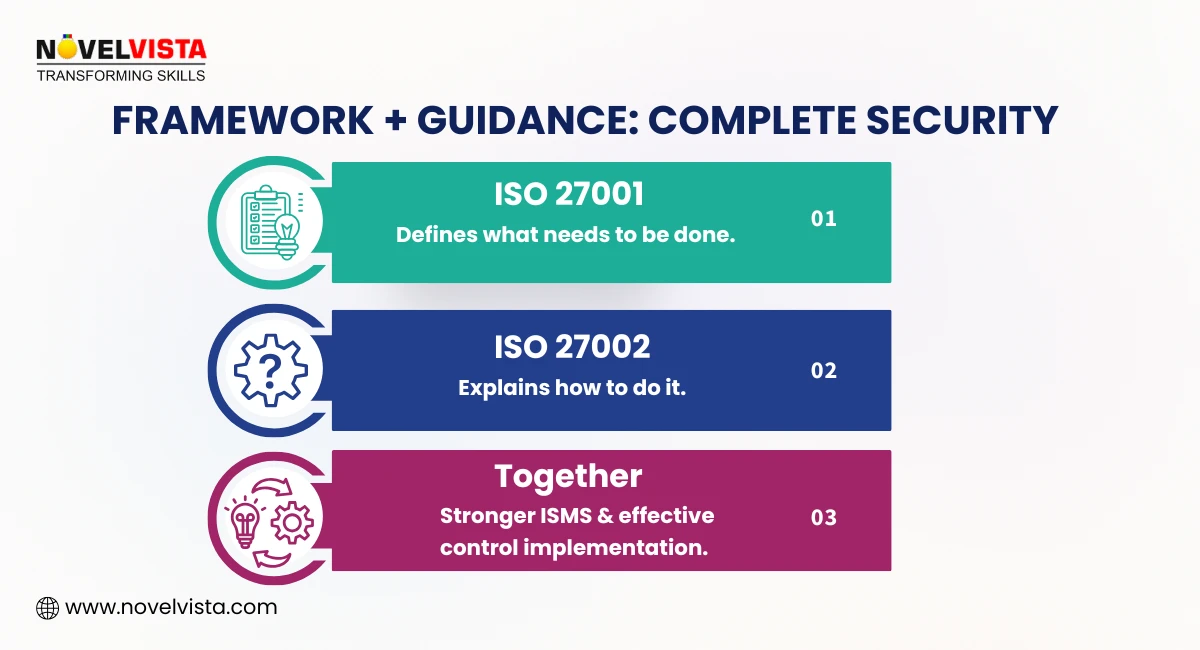
Understanding both is vital for lead auditors:
- ISO 27001 Focus: Auditors assess governance, risk management, defined roles, and ISMS structure. They check compliance with mandatory requirements (clauses 4–10) and ensure that top management is involved in security planning.
- ISO 27002 Focus: Auditors evaluate whether selected controls are implemented correctly. They check that Annex A controls are applied to address identified risks, balancing the intent of ISO 27001 with the practical execution suggested by ISO 27002.
Knowing both ensures auditors can deliver a complete audit, combining framework compliance and technical effectiveness. This dual perspective adds real value to the organization and strengthens security practices.
The Role of Lead Auditors in ISO 27001 & ISO 27002 Audits
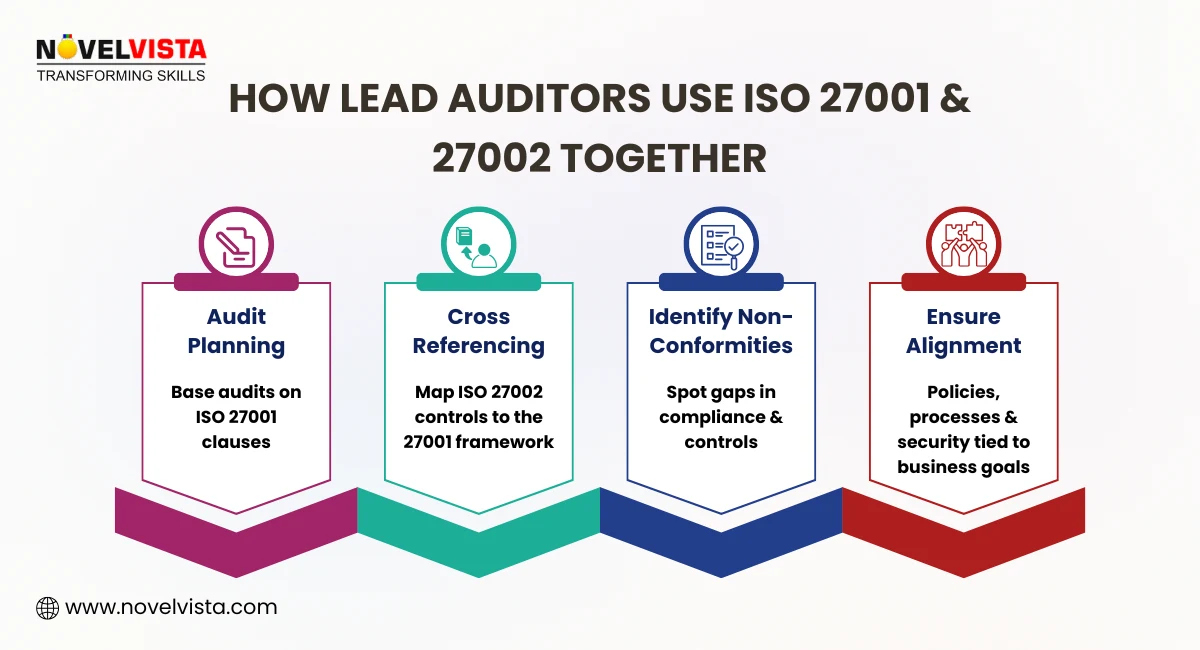
Lead auditors play a crucial role in bridging the gap between ISO 27001 vs ISO 27002. Their job goes beyond checking documents; they ensure that the ISMS is robust, effective, and aligned with organizational goals. Here’s how auditors make a difference:
- Planning and Conducting ISMS Audits: Lead auditors prepare audit plans based on ISO 27001 clauses and use ISO 27002 as a guide to evaluate control implementations. This ensures a holistic review covering both what needs to be done (27001) and how it’s done (27002).
- Cross-Referencing Framework and Guidance: During audits, lead auditors map ISO 27002 controls to ISO 27001 requirements, ensuring organizations not only meet compliance but also implement practical, risk-mitigating measures.
- Identifying Non-Conformities: Auditors spot gaps where the organization fails to meet ISO 27001 requirements or where controls from ISO 27002 aren’t applied effectively. They provide actionable recommendations to close these gaps.
- Ensuring Organizational Alignment: Lead auditors help align policies, processes, and security controls with business objectives, making sure the ISMS supports risk management, compliance, and operational efficiency.
By combining knowledge of both standards, auditors ensure SRE organizational value, enhancing security, reliability, and operational resilience.
Benefits of ISO 27001 & ISO 27002 from a Lead Auditor’s Lens
For Organizations
- Stronger Compliance: Achieve alignment with regulations like GDPR, HIPAA, and local data protection laws.
- Reduced Cybersecurity Incidents: Properly implemented controls lower the likelihood of breaches.
- Boosted Trust: Clients and stakeholders gain confidence in the organization’s security posture.
For Lead Auditors
- Broader Expertise: Understanding both the framework (ISO 27001) and controls (ISO 27002) enhances auditor credibility.
- Higher Employability: Certified auditors are in demand globally.
- Delivering Value Beyond Compliance: Auditors can recommend improvements that enhance operational security and business performance.
This dual perspective is key to demonstrating the SRE business impact and long-term SRE ROI from effective ISMS audits.
Also Read: Common Misconceptions about ISO 27001 Lead Auditor CertificationCommon Challenges for Lead Auditors
Even experienced auditors face challenges when handling ISO 27001 vs ISO 27002:
- Misinterpreting ISO 27002 as Mandatory: Remember, ISO 27002 is guidance, not a certifiable standard. Auditors must communicate this clearly to organizations to avoid confusion.
- Balancing Governance and Control Effectiveness: Auditors need to evaluate both the framework compliance (27001) and the practical implementation of controls (27002) simultaneously, which requires skill and experience.
- Keeping Up With Evolving Risks: Cybersecurity risks change rapidly. Lead auditors must stay updated on new threats, ISO revisions, and industry best practices to audit effectively.
- Translating Findings into Actionable Improvements: Auditors must not only identify gaps but also provide clear, actionable recommendations that organizations can implement.
Conclusion
Understanding iso 27001 vs iso 27002 is critical for lead auditors who aim to deliver comprehensive ISMS audits. ISO 27001 defines what must be done, while ISO 27002 explains how to do it effectively. Mastering both standards ensures auditors can evaluate both governance and control implementation, enhancing organizational security and compliance.
By combining these insights, lead auditors provide SRE organizational value, demonstrate SRE ROI, and help organizations maintain robust, resilient, and compliant information security management systems.
Next Step: Get Certified with NovelVista
Are you ready to elevate your auditing career? NovelVista’s ISO 27001 Lead Auditor Certification equips you with the knowledge and tools to interpret ISO 27001 requirements and leverage ISO 27002 guidance for effective audits. Gain practical insights, enhance your professional credibility, and provide tangible value to organizations by mastering both standards.
Frequently Asked Questions
Author Details

Mr.Vikas Sharma
Principal Consultant
I am an Accredited ITIL, ITIL 4, ITIL 4 DITS, ITIL® 4 Strategic Leader, Certified SAFe Practice Consultant , SIAM Professional, PRINCE2 AGILE, Six Sigma Black Belt Trainer with more than 20 years of Industry experience. Working as SIAM consultant managing end-to-end accountability for the performance and delivery of IT services to the users and coordinating delivery, integration, and interoperability across multiple services and suppliers. Trained more than 10000+ participants under various ITSM, Agile & Project Management frameworks like ITIL, SAFe, SIAM, VeriSM, and PRINCE2, Scrum, DevOps, Cloud, etc.
Course Related To This blog
ISO 27001:2022 Lead Auditor
Confused About Certification?
Get Free Consultation Call

